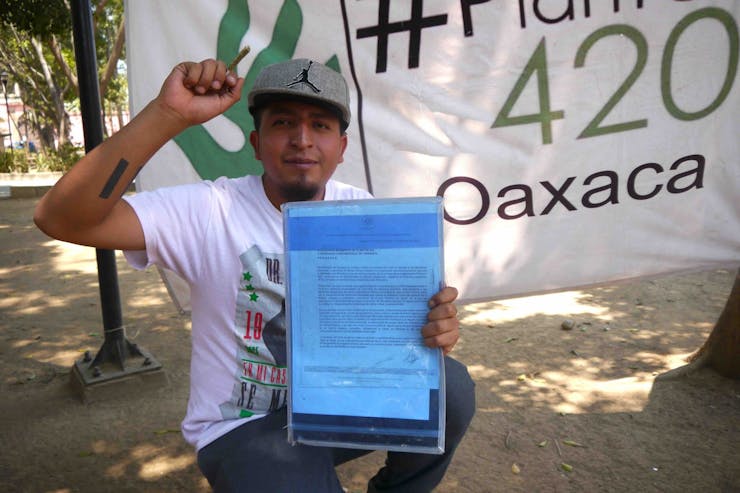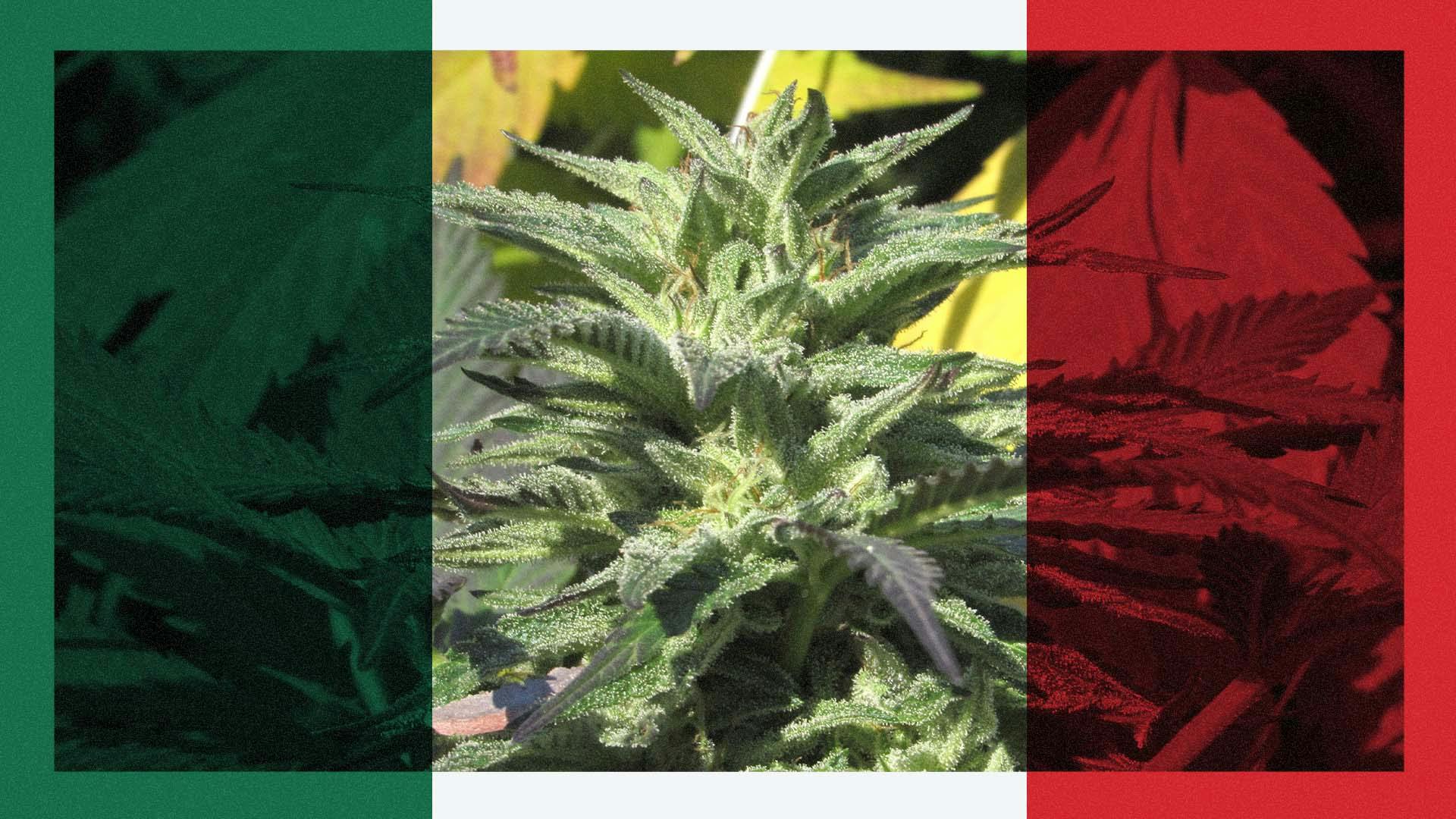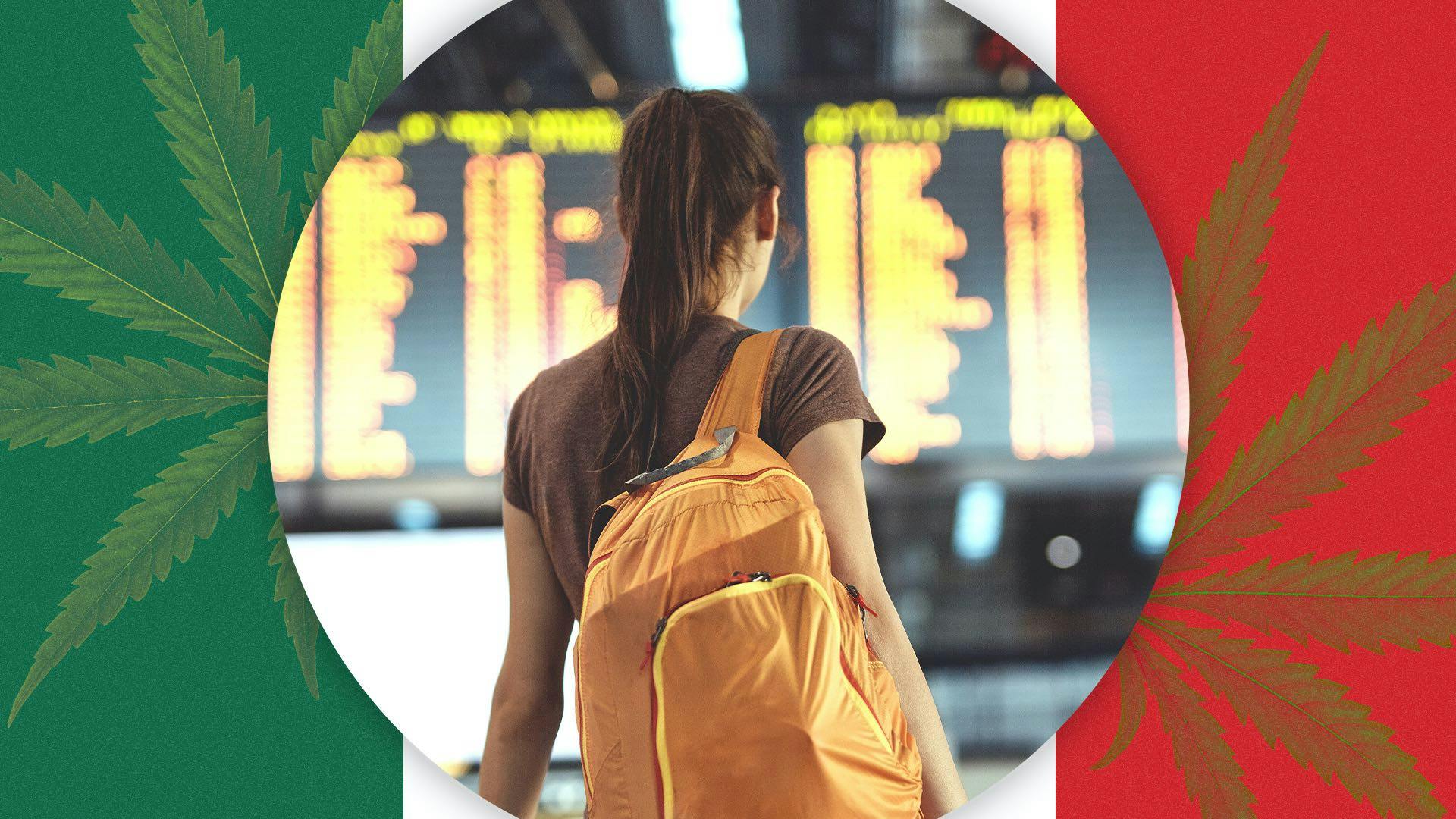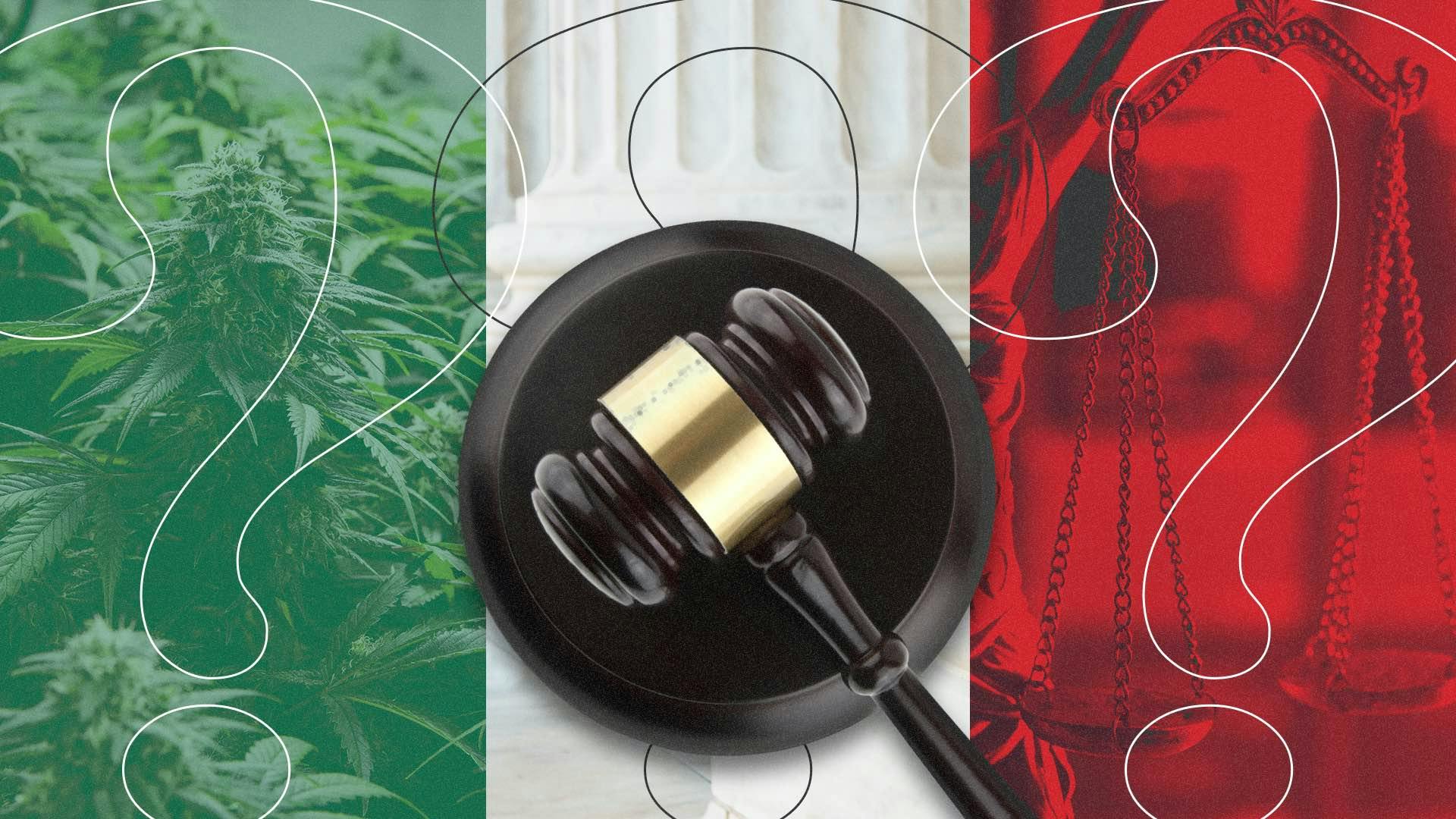OAXACA DE JUÁREZ – Cannabis consumers here in Mexico’s culinary capital celebrated 4/20 by smoking and eating neon green weed-infused cake in front of the police.
As heavily armed cops looked on, activists distributed slices of the pastel along with copies of a recent local authority letter—the first of its kind in Mexico—that gives a green light to public marijuana smoking. As the clock struck 4:20pm on April 20th, about 300 people lit up before tucking into the eye-catching cake.
What’s remarkable about the scene isn’t so much the 4/20 celebration. It’s that the same acts are now legal in Oaxaca de Juárez, capital of the state of Oaxaca, on April 21, April 22, and every day thereafter.
City to cops: Let our people smoke
Days before 4/20—in an almost surreal twist typical of life in Mexico—the Oaxaca city council ordered police to cease an allegedly commonplace practice of harassing cannabis consumers smoking publicly. In a letter of comfort (ie, a statement of city policy), the council paid tribute to the peaceful campaigning of activist group Plantón 4:20 to “defend their rights.”

The groundbreaking municipal policy came not after the passage of a new law, nor a decree, but simply reflected an acceptance by the municipality that no local law exists to prevent public cannabis consumption in a country where possession of up to 5 grams has been decriminalized since 2009.
Oaxaca City has become the first city in Mexico, a historic crucible of the global war on drugs, to explicitly permit the consumption of cannabis in broad daylight.
City to consumers: Read the room
The city’s letter included a caution to consumers to express their newfound freedom with consideration for those around them.
“There is no municipal regulation that expressly prohibits responsible personal consumption of cannabis in public spaces,” the letter said. “A call is made to consumers to avoid consuming cannabis in places where there are children or there is express disagreement from other people.
“This municipal authority urges the municipal police [to] refrain from causing acts of inconvenience to consumers” and only to ask consumers to move on if they are smoking in the vicinity of children or those who roundly object.
Federal legalization still in progress, slowly
As Leafly has previously reported, federal laws remain cloudy and unsettled regarding the consumption of cannabis. Mexico’s legislature continues to deliberate sluggishly over legalization following a series of Supreme Court judgements striking down prohibition. As the federal process has bogged down, the fragrant tailwinds of change are gaining in state and municipal actions like we’re seeing in Oaxaca this month.
Congress is still expected to legalize later this year after the court judgements effectively mandated them to act. Those court rulings are pushing legislators to act, despite President Andres Manual Lopez Obrador’s own hesitancy. The President’s most recent pronouncement on the issue came last summer, when he floated the idea of a national referendum on legalization, for which he says there is no consensus.
The Oaxaca scene on 4/20 this year

At El Llano park in the centre of the Oaxacan state capital on April 20th, a number of locals told Leafly that they decided to smoke in public for the first time ever, due to the council directive.
“We smoked in secret, never in public,” said local judo teacher Moises Velasco, as he smoked a purro. “The police would take you to the station, even for a small amount, and extort you. But I’m happy to be here today after this big step forward. I didn’t think it would happen so soon, even if we’re still surrounded by police in this park right now.”
Cannabis was not sold at the event, unlike at protest smoke-ups in Mexico City, where activists often ignore the fact that selling remains illegal. Tony Presidio, from Plantón 4:20, the organization leading the demonstrations, regularly informed attendees—from a cross-section of society—that under federal law they are only permitted to carry up to 5 grams, and not purchase or sell in public.
‘We are happy and will behave responsibly’
His cautions came between whoops of celebration on the mic, as other speakers took turns to gently taunt the machine-gun-carrying groups of cops drinking sodas and leaning on armored vehicles nearby.
“This is the first rico public cannabis culture festival in the city of Oaxaca,” said Presidio, who has played a significant role in the long-term smoke-up protest outside the Senate in Mexico City. “We have a document that supports us and brings us peace. The police can no longer rob, violate and beat us. We are happy and we will behave responsibly. We are in the eyes of the whole country.”
Presidio got down on one knee, holding a copy of the council letter in a clenched fist held aloft. He brandished a joint in his other hand. Defiant tears of joy filled the corners of his eyes.

A city with a culture of activism
Oaxaca de Juárez is well known for serious political activism, which has sometimes been fatally put down by authorities.
4/20 was the culmination of three months of strident activism in the city. At one protest, in February, Tony Presidio was arrested along with three others who were smoking openly—perhaps wanting to be detained, like Extinction Rebellion campaigners. But he was arrested for a general public order offense, not for a cannabis-related crime.
That led activists to investigate the municipal laws, where they could not find any law outlawing cannabis consumption.
“Our community forms an important part of public life in the city and the authorities recognized that there was a little gap,” said an activist who identified herself as Magic Jane. She’s an organizer with Plantón 4:20’s women’s network in Oaxaca.
A new way to push decriminalization
The promising response of Oaxaca city leaders could lead to similar tactics being tried in other cities across Mexico.
“Oaxaca shows that the decriminalization of public cannabis use is possible, even without changing the law,” said Jorge Hernández Tinajero, the president of the Mexican Association of Cannabis Studies. “A little political will and a couple of guidelines to the police and public ministries are enough to prevent consumers from being falsely labelled dealers and their arrest used by the police to simulate a fight against drug trafficking which in fact is usually only waged against the most vulnerable.”

At this year’s 4/20 protest in Oaxaca, between rap performances and a mix of reggae and cumbia music, campaigners made it clear that one of the next steps is to transform wider perceptions of cannabis. The city council’s historic letter, which is emboldening campaigners across the country , has already gone a long way toward achieving this goal.
“Decriminalization implies that smoking cannabis is not bad, thus eliminating the stigma,” Hector Aguilar, from Cannabislibre, which operates a cannabis social club, told the 4/20 crowd. “That is what touches us now as a society, and that process is already taking place. Thank you to the police for listening to this … It is historic that we in Oaxaca today can smoke a joint and the police are obliged to protect us.”
Seeking a Mexican model, not following the United States
But, addressing fellow pachecos, stoners, he said that advocates are not now calling for versions of market liberalization, such as in Florida, where there are strict barriers for large-scale cultivation which effectively favor white-owned, longer established businesses. “It is a model which still prohibits and forces me to ask how many apples that I can grow.”
Instead, there are calls for the beginning of mass production in an attempt to prevent a corporate takeover of the trade. At 4:20pm, two young men gave an idiosyncratic demonstration on how to make an organic fertilizer with rice to grow weed. “They’re showing people how to prepare the land and that it just takes a seed, with no chemicals,” one onlooker noted.
Indigenous growers gaining rights too
This vast southern state has some of the best conditions in the country for the cultivation of the plant, the president of the Indigenous Cannabis Producers’ Association of Oaxaca said last week. “We need the authorities to listen to our requests for the empowerment of indigenous peoples,” he told local media.
Also this month, 26 indigenous communities received the right to cultivate cannabis for medical use. That permission was already legal in name, but had exited without an operational framework from federal authorities. Now those Zapotec campesino towns have the firm right to grow within certain parameters.
What do we want? To grow plants
Still, many of the activists Leafly spoke to on 4/20 remained distrustful of the state. They’re convinced that cannabis should not be subject to stricter rules than other common, endemic plants. They do not want to be forced to seek permits to grow limited amounts of mota.
“We have not been asking the authorities to regulate but simply consider our human rights,” Magic Jane said, after cutting the ceremonial cake. “The next step is to secure free cultivation rights.”








